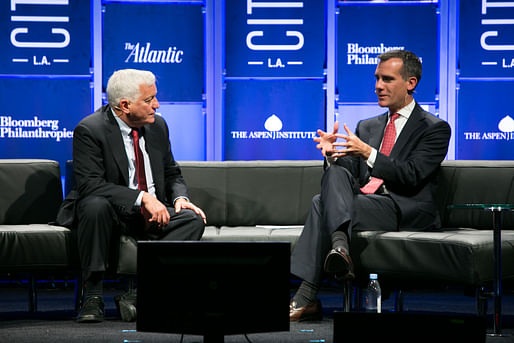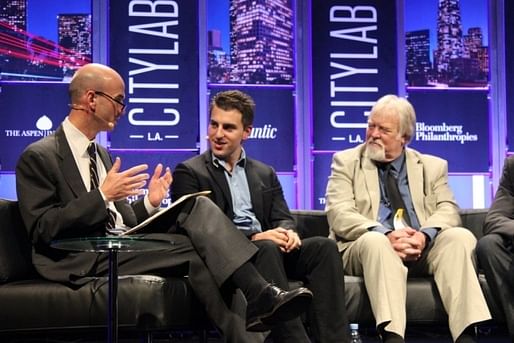

For two days on the cusp of fall, a gaggle of mayors, journalists, technologists, and civic-minded entrepreneurs convened for The Atlantic’s CityLab 2014 conference in still-balmy downtown Los Angeles. The full title, "Urban Solutions to Global Challenges", jumps off of the presumption that cities, not countries, are at the forefront of public innovation, and then dives into the waters where civic tech and urban life intermingle – where local governments have got to make better use of digital technology, and fast. To take the panels and presentations as gospel, our cities are at the best of times and the worst of times; climbing to dizzying heights of technological capabilities and entrepreneurial hopes, while caught in the social and rhetorical undertows of the big “G” word, income inequality and population growing pains. But throughout the lofty jargon, the clearest concern was how cultural shifts in information technologies can improve urban development.
It’s easy to point to instances where governments have failed, or stumbled, technologically speaking (critics of the Affordable Health Care Act roll out, and more sensitively, the NSA's large-scale surveillance), but more thorny is the essential differentiation between public and private tech (and therefore public vs. private data), and how private enterprise seems to always best public capabilities. As brought up by Tumml co-founder Clara Brenner, during a panel on civic innovation, city governments rarely have incentives to fund and maintain services like transit apps, when a private group with specific interest and flexibility can respond to that need more cheaply and efficiently. Whether or not it is the ethical responsibility of government to deal with these things was a debate left outside the automatic doors of the hosting JW Marriot Hotel. But there’s no doubt that cities must deal with this phase-change, and only stand to benefit economically and socially if they do so successfully. Brian Chesky, Airbnb’s co-founder, in conversation with information science professor Arun Sundararajan, spoke about how the sharing economy is turning cities back into villages; where (presumably) social ties and communities were stronger, and you and your neighbor knew you could lean on one another.

And while politicians certainly aren’t sharing their beds with every sharing economy business that crops up, partnerships have been forged, like when Brazil reached out to Airbnb to accommodate overflowing World Cup attendance. In his "Reinventing City Hall" talk, Los Angeles Mayor Eric Garcetti referred to himself as an "open-source" mayor, up-talking his commitment to technological innovation like driverless vehicles (as well as laying on some mayoral branding). He further characterized Mayors as lacking the luxury of partisan politics, distancing himself from Congressional hang-ups. It's essential that cities learn to manage this "peer-to-peer" style of business, not only to prioritize public safety, but to strengthen their local economies. Sharing on a peer-to-peer basis is the loaning of assets from the owner to someone else, and creating brick and mortar businesses for these services, that effectively mediate peer-to-peer exchanges, can serve as foundations for thriving urbanism. Establishing mixed-use zoning in cities is necessary to accomplish this same end.
Dayne Walling, mayor of Flint, Michigan spoke avidly about the desire to bring manufacturing back to where the local business are based – which in order to work, needs mixed zoning. Kate Sofis, executive director of SFMade/Urban Manufacturing Alliance, agreed: more diversity of program in a given place, more opportunities for sharing resources across those programs. This in turn strengthens local economies and neighborhood feel. Betsy Hodges, the mayor of Minneapolis, extended this pro-mixed-use platform to include mixed-income populations – which can be partially accomplished through zoning of affordable housing and transportation access. But to ground all of this, and make it appealing to citizens, public housing has to look good, and affordability has to be established "in perpetuity".

Politicians and technologists seemed to agree, that the sharing economy isn’t going away, and we need to start dealing seriously with not just its implications for certain industries, but its social and humanist impacts as well. Airbnb's Chesky referred to his company not as a service-provider, but as a platform – a "streamlined system for trust", that creates accountability out of the Internet's anonymity. What types of cities are emerging in a U.S. where people trust private tech more than public policy to address their issues, but where government regulators are still at a loss of how precisely to deal with it all? An economic eventually emerges as urban change, as has been seen countless times with industrialization, international manufacturing, "Bilbao effects", gourmet toast cafes and even broken windows. And architecture is the elemental unit of that evolution, to serve or impede.
Note: Local NPR affiliate KPCC recorded many of the CityLab panels, which you can listen to here.
1 Comment
Personally, I don't trust Uber or Lyft and likely never will. Maybe it's because for the last 45 years of my life I've been told not to get into a car with a stranger. I think the sharing economy has seriously different implications for women and men, and I think this aspect has been mostly ignored.
Block this user
Are you sure you want to block this user and hide all related comments throughout the site?
Archinect
This is your first comment on Archinect. Your comment will be visible once approved.